The Nutritional Powerhouse of Oyster Mushrooms
Oyster mushroom nutritional value is truly impressive for such a delicate-looking fungus. For those looking for a quick answer about their nutritional content, here's what you need to know:
Beyond these basic nutrients, oyster mushrooms contain powerful compounds including beta-glucans and ergothioneine, which support healthy immune function and provide antioxidant protection.
Oyster mushrooms (Pleurotus ostreatus) have been gaining popularity for good reason. These fan-shaped fungi aren't just delicious with their mild, subtly sweet flavor and tender texture—they're also remarkably nutritious while being low in calories. Whether you're looking to add more plant-based protein to your diet, boost your intake of essential vitamins and minerals, or simply enjoy a versatile ingredient that works in countless recipes, oyster mushrooms deliver exceptional value.
What makes them special is their unique nutritional profile that stands out even among other mushroom varieties. They provide a complete protein containing all nine essential amino acids (rare for plant foods), substantial amounts of B vitamins for energy metabolism, and minerals like potassium, copper, and iron that many people don't get enough of in their diets.
I'm Brandi Garden, co-founder of Eversio Wellness, and my fascination with oyster mushroom nutritional value began during my personal journey with autoimmune challenges, leading me to explore functional mushrooms as natural wellness solutions.
Oyster Mushrooms 101: Identification & Varieties
Have you ever spotted those neat, fan-shaped mushrooms at your local farmers' market or growing in shelves along fallen trees in the woods? Those are likely oyster mushrooms, one of nature's most versatile fungi treasures.
Oyster mushrooms belong to the genus Pleurotus and have earned their place as one of the world's most widely cultivated mushrooms. Their name comes from their distinctive oyster-shaped caps and the subtle seafood-like aroma they release when cooked. In their natural habitat, these helpful decomposers grow on dead or dying trees (particularly hardwoods), breaking down wood and recycling nutrients back into the forest ecosystem.
What makes oyster mushrooms truly fascinating is their remarkable diversity. While most people recognize the common pearl oyster mushroom (Pleurotus ostreatus), the Pleurotus family includes numerous species with striking variations in color, size, and flavor profiles.
How to Recognize Them in the Wild
If you're interested in foraging for oyster mushrooms (always with expert guidance), here's how to identify these woodland treasures:
Fan-shaped caps are the most distinctive feature of oyster mushrooms, typically ranging from 2-10 inches in diameter with a smooth, sometimes slightly wavy edge. Their decurrent gills (which run down the stem) are white to cream-colored and closely spaced. Unlike many mushrooms that have central stems, oyster mushrooms feature short, off-center stems that often appear to emerge from the side of the cap rather than underneath it.
You'll typically find them growing in shelf-like clusters on dead or dying hardwood trees. When fresh, they emit a subtle anise-like or mild seafood aroma that becomes more pronounced when cooked. If you're doing a spore print (a technique used by foragers to help with identification), oyster mushrooms produce a white to lilac-gray spore print.
A word of caution: safety is absolutely paramount when foraging. Never consume wild mushrooms unless you are 100% certain of their identification, preferably with verification from an experienced mycologist. Many toxic look-alikes exist in the forest, and misidentification can lead to serious health consequences.
Key Cultivated Species and Nutritional Nuances
The oyster mushroom nutritional value varies slightly depending on the specific species, with each offering its own special benefits:
Pearl Oyster (Pleurotus ostreatus) is the most common variety, featuring gray to brown caps. It's particularly high in protein and B vitamins, making it a staple in many kitchens.
King Oyster (Pleurotus eryngii) stands out with its thick, meaty stem that resembles scallops when sliced. It contains more protein and fiber than other varieties, making it particularly satisfying in meals.
Pink Oyster (Pleurotus djamor) catches the eye with its vibrant pink caps (which fade when cooked). Beyond its visual appeal, it contains higher levels of antioxidants than its oyster mushroom cousins.
Blue Oyster (Pleurotus columbinus) features stunning blue-gray caps and a more robust flavor profile. It's especially rich in ergothioneine, an amino acid with powerful antioxidant properties.
Golden Oyster (Pleurotus citrinopileatus) brightens any dish with its sunny yellow caps and delightful fruity aroma. This variety contains notably higher levels of potassium than other oyster varieties.
Phoenix Oyster (Pleurotus pulmonarius) resembles pearl oysters but with lighter coloration and better heat tolerance. Its nutritional profile is comparable to pearl oysters, making it equally valuable for culinary and health purposes.
While each variety offers slightly different nutritional benefits, all oyster mushrooms deliver an impressive package of protein, fiber, vitamins, and minerals while being naturally low in calories and fat. This remarkable nutritional profile makes them not just a delicious addition to meals, but a smart choice for supporting overall wellness.
Oyster Mushroom Nutritional Value
When you look at these delicate, fan-shaped fungi, you might not guess just how nutritionally dense they truly are. The oyster mushroom nutritional value profile packs a surprising punch in a small package. Let's explore what makes these mushrooms a standout addition to your meals.
A standard 1-cup (86g) serving of raw oyster mushrooms contains just 28 calories, making them an excellent low-calorie food option. They're composed of about 90% water, which contributes to their light, delicate texture. Despite this high water content, they still deliver 3g of protein, 5g of carbohydrates (with 2g being dietary fiber), and less than 1g of fat.
What's remarkable isn't just these numbers, but what's behind them. Unlike many plant foods, the protein in oyster mushrooms contains all nine essential amino acids—making them a complete protein source that's especially valuable for those following plant-based diets.
Macronutrients: Why the oyster mushroom nutritional value stands out
The macronutrient profile of oyster mushrooms offers several unique advantages that make them special in the culinary and nutritional world.
Their protein quality is exceptional—the complete amino acid profile supports muscle maintenance, immune function, and overall health. For vegans and vegetarians looking for diverse protein sources, oyster mushrooms provide a welcome option that doesn't come with the higher calorie counts of many other protein foods.
The fiber content (2g per cup) might seem modest, but it's predominantly beta-glucans—a type of soluble fiber with research-backed benefits for heart health and immune function. This fiber contributes to the satisfying, meaty texture that makes oyster mushrooms such a versatile ingredient in many dishes.
For those watching their weight, the low-calorie density of oyster mushrooms is a true asset. At just 28 calories per cup, you can enjoy a satisfying portion without worrying about calorie overload. They provide substantial volume and nutrition for very few calories, creating that feeling of fullness that helps with portion control.
Even keto diet followers can enjoy oyster mushrooms freely. With just 5g of carbohydrates per cup (and 2g of that being fiber), they fit nicely into low-carb eating patterns while providing nutrients that might otherwise be lacking.
Micronutrients that drive oyster mushroom nutritional value
The oyster mushroom nutritional value really shines when you look at their micronutrient profile. They're particularly rich in B vitamins, which play crucial roles in energy metabolism and nervous system function:
Niacin (B3) leads the pack at 27% of your Daily Value (DV), with riboflavin (B2) following closely at 23% DV, and pantothenic acid (B5) at 22% DV. These B vitamins are essential for converting food into energy and supporting cellular health.
The mineral content is equally impressive. Copper stands out at 22% DV, supporting iron metabolism and nerve function. You'll also find potassium (8% DV), important for heart function and fluid balance; iron (6% DV), essential for oxygen transport; phosphorus (13% DV), supporting bone health; and zinc (5% DV), which aids immune function.
Some oyster mushrooms also contain ergosterol, which converts to vitamin D when exposed to UV light. In fact, commercial growers often deliberately expose their mushrooms to UV light to boost their vitamin D content—a nutrient many people don't get enough of, especially during winter months.
Antioxidant & Unique Compounds Powerhouse
Beyond standard nutrients, the exceptional oyster mushroom nutritional value comes from their bioactive compounds that support overall health in multiple ways.
Ergothioneine, a unique amino acid found in high concentrations in oyster mushrooms, acts as a powerful antioxidant that may protect cells from oxidative damage. This compound is rare in our food supply, making mushrooms one of the few dietary sources.
The beta-glucans in oyster mushrooms do double duty—beyond their fiber benefits, they have immune-modulating properties and may help regulate blood sugar and cholesterol levels. These complex carbohydrates interact with immune receptors in our bodies, potentially enhancing our natural defense systems.
Oyster mushrooms also contain various phenolic compounds with antioxidant and anti-inflammatory properties, helping to combat oxidative stress in the body. Some research suggests they contain natural compounds similar to lovastatin, which may support healthy cholesterol levels.
The polysaccharides in oyster mushrooms have been studied for their potential immune-modulating effects, making these fungi not just nutritious but potentially functional foods that support wellness beyond basic nutrition.
This remarkable combination of nutrients and bioactive compounds creates a nutritional profile that supports overall health in multiple ways—from immune function to heart health to cellular protection—all in a delicious, versatile food that's as at home in a gourmet recipe as it is in a simple stir-fry.
Bioactive Compounds & Science-Backed Health Benefits
The impressive oyster mushroom nutritional value goes far beyond basic nutrients. These fungi contain a remarkable array of bioactive compounds that work together to support overall wellness in multiple ways. Recent research has revealed just how these natural compounds contribute to our health.
Heart & Cholesterol Support
When it comes to cardiovascular health, oyster mushrooms offer some fascinating benefits. They contain natural compounds structurally similar to lovastatin – a medication commonly prescribed to lower cholesterol levels. These compounds may help inhibit an enzyme called HMG-CoA reductase, which plays a key role in cholesterol production in your body.
The beta-glucans found in oyster mushrooms also deserve special attention. When you consume these soluble fibers, your gut bacteria ferment them into short-chain fatty acids (SCFAs). These SCFAs may help reduce cholesterol synthesis in your liver, supporting healthy cholesterol levels naturally.
What's particularly impressive is how oyster mushrooms appear to affect different types of cholesterol. Research suggests that regular consumption may help reduce LDL (often called "bad" cholesterol) while maintaining or even increasing HDL (the "good" cholesterol). A study published in the International Journal of Medicinal Mushrooms found that participants who included oyster mushrooms in their diet experienced modest but meaningful reductions in total cholesterol and LDL levels compared to control groups.
Blood Sugar & Metabolic Balance
Many people are surprised to learn that oyster mushrooms can help support healthy blood sugar levels through several natural mechanisms.
The fiber content in oyster mushrooms creates a gel-like substance in your digestive tract that slows the absorption of sugars, potentially helping to prevent those unwelcome blood sugar spikes after meals. This post-prandial glucose management is valuable for anyone looking to maintain stable energy levels throughout the day.
There's also evidence suggesting that compounds in oyster mushrooms may help improve insulin sensitivity. This means your cells can more effectively use glucose from your bloodstream, supporting overall metabolic health. The combination of these effects makes oyster mushrooms a valuable food for those focused on maintaining healthy blood sugar levels or supporting overall metabolic wellness.
Immune & Inflammation Modulation
Perhaps the most well-studied benefits of oyster mushrooms relate to their immune-supporting properties. At the heart of this is a specific type of beta-glucan called pleuran, which has been studied for its remarkable ability to modulate immune response.
Pleuran appears to help activate macrophages and other immune cells, essentially giving your body's natural defense systems a gentle boost. What makes this particularly valuable is that it's not simply stimulating your immune system, but rather helping to balance its response.
The compounds in oyster mushrooms also appear to help regulate the production of cytokines – the cell signaling molecules that play a crucial role in both immune response and inflammation. This balanced approach to immune support is complemented by the mushroom's antioxidant content, particularly ergothioneine, which helps neutralize free radicals and reduce oxidative stress.
A study published in BMC Complementary Medicine and Therapies found that polysaccharides extracted from oyster mushrooms demonstrated significant anti-inflammatory effects by inhibiting pro-inflammatory signaling pathways. This combination of immune-modulating and anti-inflammatory properties makes oyster mushrooms a valuable addition to any wellness-focused diet.
The beauty of oyster mushrooms lies in how these various bioactive compounds work together synergistically to support different aspects of health simultaneously. Rather than targeting a single pathway, they offer comprehensive support for multiple body systems – making them truly one of nature's most remarkable functional foods.
How Oyster Mushrooms Stack Up Against Other Edible Fungi
When you're exploring edible mushrooms, it's helpful to understand how the oyster mushroom nutritional value compares to other popular varieties. Each mushroom brings something special to the table, but oyster mushrooms stand out in several impressive ways.
If you've ever wondered how your favorite oyster mushrooms measure up against button mushrooms (those common white mushrooms found in nearly every grocery store), there are some significant differences worth noting. Oyster mushrooms contain approximately 30% more protein than their button counterparts, making them an excellent choice if you're looking to boost your protein intake. They're also significantly richer in essential B vitamins like niacin and riboflavin, as well as providing more potassium to support healthy blood pressure. Where oyster mushrooms really shine is in their ergothioneine content – this unique antioxidant amino acid is found in higher concentrations in oysters than buttons. That said, button mushrooms do have their strengths, particularly when it comes to selenium content.
When comparing oyster mushrooms to shiitake, another culinary favorite, the differences become more nuanced. Shiitake mushrooms contain slightly more calories and carbohydrates, while oyster mushrooms edge them out in protein content per serving. If you're looking for vitamin D (particularly in shiitakes that have been exposed to UV light), shiitake mushrooms typically contain more. Both varieties contain valuable beta-glucans that support immune function, though the molecular structures and potential effects vary slightly between the two.
Portobello mushrooms – those meaty, large-capped mushrooms perfect for grilling – provide more potassium and selenium than oysters. However, if you're seeking B vitamins, particularly niacin and riboflavin, oyster mushrooms are the superior choice. Both make excellent low-calorie additions to meals with similar protein profiles, though oyster mushrooms may contain higher levels of certain antioxidants that support overall health.
What makes the oyster mushroom nutritional value particularly impressive is its protein density. Among commonly consumed mushrooms, oysters rank highly for protein content per calorie, making them an especially valuable option for plant-based eaters looking to incorporate more complete proteins into their diets.
The beta-glucan content in oyster mushrooms deserves special attention. While all edible mushrooms contain these beneficial compounds, oyster mushrooms are particularly rich in pleuran, a specific type of beta-glucan that has been studied for its potential immune-modulating properties. This makes them a standout choice for supporting your body's natural defense systems.
From a mineral perspective, oyster mushrooms excel in copper content – important for energy production and iron metabolism – while varieties like cremini and portobello provide more potassium and selenium. This is why incorporating a variety of mushrooms into your diet gives you the broadest spectrum of beneficial nutrients.
Finally, let's talk flavor – oyster mushrooms offer a mild, subtly sweet profile with less intense earthiness than varieties like shiitake or portobello. This approachable taste makes them incredibly versatile in the kitchen, easily adapting to various cuisines and cooking methods without overpowering other ingredients.
While all edible mushrooms offer valuable nutrients and health benefits, the unique oyster mushroom nutritional value profile makes them a standout choice for anyone looking to improve their diet with nutrient-dense, delicious fungi. Consider incorporating them alongside other mushroom varieties for the most comprehensive nutritional benefits.
Cooking, Storage & Smart Ways to Eat More Oyster Mushrooms

Getting the most from the remarkable oyster mushroom nutritional value means knowing how to prepare, cook, and store these delicate fungi. With their tender texture and mild, subtly sweet flavor, oyster mushrooms are incredibly versatile in the kitchen and can lift countless dishes while boosting your nutrient intake.
Retaining Maximum Nutrients While Cooking
The delicate nature of many nutrients in oyster mushrooms means your cooking approach can significantly impact their nutritional benefits:
Quick cooking methods work best for preserving those heat-sensitive vitamins and antioxidants. I've found that a quick sauté over medium-high heat for just 3-5 minutes brings out their wonderful flavor while maintaining their nutritional integrity. Stir-frying and brief roasting are similarly effective approaches.
While a bit of oil helps your body absorb fat-soluble nutrients from the mushrooms, there's no need to go overboard. A light touch with oil not only keeps calories in check but allows the mushrooms' natural flavors to shine through. I personally love using a small amount of olive oil or ghee for their complementary flavors.
When it comes to washing, less is more. Rather than soaking your oyster mushrooms (which can cause them to absorb water and leach out water-soluble vitamins), a quick rinse or gentle wipe with a damp cloth just before cooking is all you need.
Interestingly, some research suggests that moderate heat (around 212-248°F or 100-120°C) may actually increase the availability of certain antioxidants in mushrooms. And the good news is that ergothioneine—that unique antioxidant that makes oyster mushrooms so special—remains relatively stable during cooking, so you'll retain most of its benefits regardless of your cooking method.
Meal-Prep Inspiration
The mild flavor and meaty texture of oyster mushrooms make them incredibly adaptable to various cuisines and cooking styles:
Stir-fries showcase oyster mushrooms at their best. Their quick cooking time makes them perfect partners for colorful vegetables in a flavorful sauce. Add them toward the end of cooking to preserve their delicate texture and nutrients.
For a simple but satisfying meal, sauté oyster mushrooms with garlic and herbs, then toss with whole grain pasta. The mushrooms' umami quality creates a dish that feels indulgent while remaining nutritious.
Start your day with an oyster mushroom breakfast. Fold them into omelets or scrambled eggs for a nutrient boost that will keep you satisfied until lunch. I like to sauté them with a bit of shallot first to improve their flavor.
The meaty texture of oyster mushrooms makes them excellent plant-based alternatives in tacos, wraps, and sandwiches. Season them with your favorite spices for a satisfying meal that doesn't feel like a compromise.
For a warming treat, add sliced oyster mushrooms to soups and stews in the last few minutes of cooking. They'll absorb the flavors of the broth while maintaining their pleasing texture.
King oyster mushrooms, with their particularly substantial stems, can be sliced into "scallops" and pan-seared for an impressive plant-based seafood alternative. They also make excellent kebabs when cut into chunks and grilled.
For an easy way to incorporate more mushroom nutrition into your diet, try making mushroom powder. Simply dry oyster mushrooms thoroughly in a dehydrator or low-temperature oven, then grind them into a fine powder. This versatile ingredient can be stirred into soups, sauces, smoothies, and even coffee for a nutritional boost without altering texture.
Storage Tips for Maximum Freshness
Proper storage is key to preserving the oyster mushroom nutritional value until you're ready to enjoy them:
Fresh oyster mushrooms do best in the refrigerator, but avoid plastic bags or containers which trap moisture and accelerate spoilage. Instead, store them in a paper bag or wrapped loosely in paper towels to absorb excess moisture while allowing them to breathe.
To extend their life even further, try the paper towel method—gently wrap mushrooms in paper towels before refrigerating to absorb moisture that could lead to spoilage. Check and replace damp towels as needed.
Remember to avoid washing until ready to use. Moisture is the enemy of fresh mushrooms, so only rinse them right before cooking to prevent premature spoilage.
For longer-term storage, drying oyster mushrooms is an excellent option. Once thoroughly dried in a food dehydrator or low-temperature oven, they'll keep for months in an airtight container. Rehydrate them in warm water when you're ready to use them, or grind them into powder as mentioned above.
If you have more fresh mushrooms than you can use right away, consider freezing them. For best results, briefly sauté them first to preserve texture and flavor. Once cooled, pack them in freezer-safe containers or bags. They can then be added directly to recipes from frozen—perfect for soups, stews, and sauces.
With these cooking and storage techniques in your culinary toolkit, you can make the most of oyster mushrooms' exceptional nutritional benefits while enjoying their delicious flavor and versatility. They're truly one of nature's most perfect foods—nutritious, sustainable, and delicious.
Potential Side Effects & Foraging Precautions
While oyster mushrooms are generally one of the safest and most nutritious fungi you can add to your diet, it's always smart to be informed about potential considerations. Let's explore what you should know about possible side effects and important precautions, especially if you're interested in foraging.
Possible Side Effects
Allergic reactions to oyster mushrooms are quite rare, but they can occur. If you've never tried these mushrooms before, it's wise to start with a small amount. Watch for any unusual symptoms like skin rashes, digestive discomfort, or respiratory issues. I always recommend this approach when introducing any new food to your diet.
Some people may experience digestive sensitivity when first adding oyster mushrooms to their meals. This is actually common with many high-fiber foods as your digestive system adjusts. Starting with smaller portions and gradually increasing can help your body adapt more comfortably to their fiber content.
An interesting but extremely rare condition called hypersensitivity pneumonitis (sometimes called "mushroom worker's lung") primarily affects people who grow or handle large quantities of mushrooms professionally. This is caused by inhaling mushroom spores and isn't something the average consumer needs to worry about when enjoying oyster mushrooms with meals.
Medication Interactions
Oyster mushrooms contain natural compounds that may have mild anticoagulant effects. While the amounts in typical culinary portions aren't concerning for most people, if you're taking blood-thinning medications, it's best to maintain consistent mushroom intake rather than dramatically increasing or decreasing consumption.
Those taking immunosuppressant medications should consider consulting with their healthcare provider about regular oyster mushroom consumption. The immune-supporting properties of these mushrooms, while beneficial for most people, could theoretically interact with certain medications designed to suppress immune function.
Heavy Metal Uptake Concerns
One fascinating aspect of mushrooms is that they're excellent bioaccumulators – they readily absorb substances from their growing environment. While this helps them concentrate beneficial minerals, it also means they can absorb potentially harmful compounds if grown in contaminated areas.
Commercially cultivated oyster mushrooms are grown on controlled substrates and generally don't pose concerns about heavy metal contamination. This is one reason why many people prefer store-bought oyster mushrooms over foraged ones unless they're very experienced.
Wild foraging requires extra caution. Wild oyster mushrooms can absorb heavy metals from polluted environments, so it's crucial to avoid collecting them near industrial areas, roadsides, or locations with known environmental contamination. The oyster mushroom nutritional value can be compromised when they grow in polluted areas.
Safe Foraging Rules
If you're drawn to the trip of foraging your own oyster mushrooms, here are some essential guidelines to follow:
Always seek expert guidance – go with an experienced guide or have your findings verified by a mycology expert before consumption. Many mushroom enthusiasts join local foraging groups for this exact reason.
Identification certainty is non-negotiable. Never consume wild mushrooms unless you are 100% certain of their identification. Some toxic mushrooms can resemble oyster mushrooms to the untrained eye, and the consequences of misidentification can be serious.
Be aware of wild look-alikes such as the Angel Wing mushroom (Pleurocybella porrigens), which can be confused with white oyster mushrooms and has been associated with toxicity in some populations, particularly those with pre-existing kidney issues.
Before harvesting, conduct an environmental assessment of the area. Consider what might be in the soil or water nearby and whether the location is likely to be free from pollutants.
Use proper harvesting techniques – a clean knife to cut mushrooms rather than pulling them, and transport them in paper or mesh bags to allow spore dispersal, which helps ensure future mushroom growth.
By being mindful of these potential concerns and taking appropriate precautions, most people can safely enjoy the nutritional benefits of oyster mushrooms as part of a balanced diet. Their impressive oyster mushroom nutritional value makes them well worth including in your culinary trips, whether you're purchasing them from reliable sources or carefully foraging them yourself.
Frequently Asked Questions about Oyster Mushroom Nutritional Value
Are oyster mushrooms a good source of protein for vegans?
If you're following a plant-based diet, you'll be pleased to know that oyster mushrooms are indeed an excellent protein source. With approximately 3 grams of protein per cup, they offer something quite special in the plant world – a complete protein containing all nine essential amino acids. This makes oyster mushrooms particularly valuable for vegans and vegetarians looking to diversify their protein sources.
While they don't pack as much protein as animal sources, the quality of oyster mushroom protein is impressive. The amino acid profile is well-balanced, and the protein is highly bioavailable, meaning your body can efficiently use what you consume.
For the best results, I recommend pairing oyster mushrooms with complementary plant proteins like legumes or whole grains. A stir-fry with oyster mushrooms and tofu over brown rice or a hearty mushroom and lentil soup can create nutritionally complete meals that maximize your protein intake while enjoying delicious food.
Can I eat oyster mushrooms every day without side effects?
For most people, enjoying oyster mushrooms daily is not only safe but potentially beneficial. The impressive oyster mushroom nutritional value makes them a smart addition to your regular meal rotation. That said, as with any food, moderation and variety remain key nutritional principles.
If you're new to eating mushrooms regularly, start with smaller portions to allow your digestive system to adjust to the fiber content. Some people may experience mild digestive changes as their gut adapts to this nutrient-dense food.
It's also beneficial to rotate between different mushroom varieties throughout your week. Each type offers a unique profile of beneficial compounds, so mixing it up with shiitake, maitake, or other varieties alongside oyster mushrooms provides the broadest spectrum of nutrients.
Always ensure your mushrooms are properly cooked. Raw mushrooms contain compounds that can be difficult to digest, and cooking not only improves digestibility but can improve the bioavailability of certain nutrients.
If you have specific health conditions or take medications that might interact with bioactive compounds in mushrooms, it's worth checking with your healthcare provider about regular consumption, though adverse interactions are rare with culinary amounts.
How do oyster mushroom supplements compare to fresh mushrooms?
While fresh oyster mushrooms offer the complete package of nutrients, fiber, and culinary versatility, high-quality supplements can be a convenient alternative when fresh isn't available or practical.
Mushroom extracts and powders typically concentrate certain beneficial compounds like beta-glucans while removing the fibrous components. This means they may provide targeted benefits but lack the complete nutritional profile and culinary experience of whole mushrooms.
An interesting point to consider is bioavailability. Some compounds in mushrooms become more accessible to our bodies after cooking, which may not be replicated in certain supplement forms. However, quality supplements like those from Eversio Wellness use extraction methods that mimic this effect, ensuring you get maximum benefit.
One advantage of supplements is standardization. High-quality products are formulated to contain specific levels of bioactive compounds, ensuring consistent potency that might naturally vary in fresh mushrooms depending on growing conditions, age, and storage.
For optimal wellness benefits, I recommend incorporating both fresh oyster mushrooms in your diet when possible and high-quality supplements for convenience and targeted support. At Eversio Wellness, our mushroom extracts are made from whole fruiting bodies using dual extraction methods to ensure maximum bioavailability of both water-soluble and fat-soluble compounds, giving you the best of both worlds.
Optimize Your Mind and Body with Organic Mushroom Wellness
The remarkable oyster mushroom nutritional value we've explored is just one example of the incredible benefits functional mushrooms offer. While oyster mushrooms shine in culinary applications with their impressive nutritional profile, other functional mushrooms provide complementary benefits that can support your overall wellness journey in different ways.
At Eversio Wellness, we're passionate about using the power of these natural wonders through our premium mushroom extracts. What sets our products apart is our commitment to quality—we use only USDA Organic Certified, whole fruiting body mushrooms. Our dual extraction methods ensure maximum bioavailability of both water-soluble compounds (like those beneficial beta-glucans) and fat-soluble compounds (like triterpenes), delivering comprehensive support for your health goals.
The beauty of functional mushrooms lies in their diversity. Each variety offers unique properties that can support different aspects of wellbeing:
For immune system support, our Defend Now - Organic Turkey Tail 12:1 Extract Capsules harness the power of beta-glucans to support your body's natural defense mechanisms. These compounds have been studied for their ability to modulate immune function and promote balanced immune responses.
For cognitive function and mental clarity, our Focus Now - Organic Lion's Mane 8:1 Dual Extract Capsules contain compounds that support brain health and cognitive performance. Lion's mane has a long history of traditional use for supporting mental focus and clarity.
For stress management and relaxation, Chill Now - Organic Reishi Mushroom 15:1 Dual Extract Capsules can help promote a balanced stress response. Reishi has been revered for centuries for its adaptogenic properties that help the body steer life's challenges with greater resilience.
For energy and vitality, our Energize Now - Organic Cordyceps 8:1 Extract Capsules support natural energy production and stamina. These mushrooms have traditionally been used to combat fatigue and support overall vitality.
By adding oyster mushrooms to your meals and considering functional mushroom extracts, you’re supporting your body’s natural functions with a wide range of nutrients and beneficial compounds. This approach helps promote overall wellness as part of a balanced, healthy lifestyle.
The future is fungi, and it starts with making informed choices about incorporating these nutritional powerhouses into your daily life. Whether you're sautéing fresh oyster mushrooms for dinner or taking our premium extracts to support specific wellness goals, you're tapping into a time-tested approach to optimal health.
FAQs About Mushroom Supplements
Who should avoid taking mushroom supplements?
While mushroom supplements are generally well-tolerated, those with known mushroom allergies should avoid them. If you have an autoimmune condition, it's best to consult your healthcare provider before starting any mushroom supplement, as some varieties can modulate immune function. Pregnant or breastfeeding women should also speak with their healthcare provider first, as research in these populations is limited.
What are the risks and side effects of mushroom supplements?
Most people tolerate mushroom supplements well, with only occasional mild digestive discomfort when first starting. Allergic reactions are rare but possible. Quality matters significantly—choose supplements like ours that use organic mushrooms, test for contaminants, and clearly disclose their extraction methods and standardization levels.
Is it safe to combine mushroom supplements with medications?
Some mushroom extracts may interact with certain medications, particularly immunosuppressants, anticoagulants, and medications metabolized by the liver. Always consult with your healthcare provider before combining mushroom supplements with prescription medications. At Eversio Wellness, we recommend being transparent with your healthcare team about all supplements you're taking to ensure they complement your overall health plan.

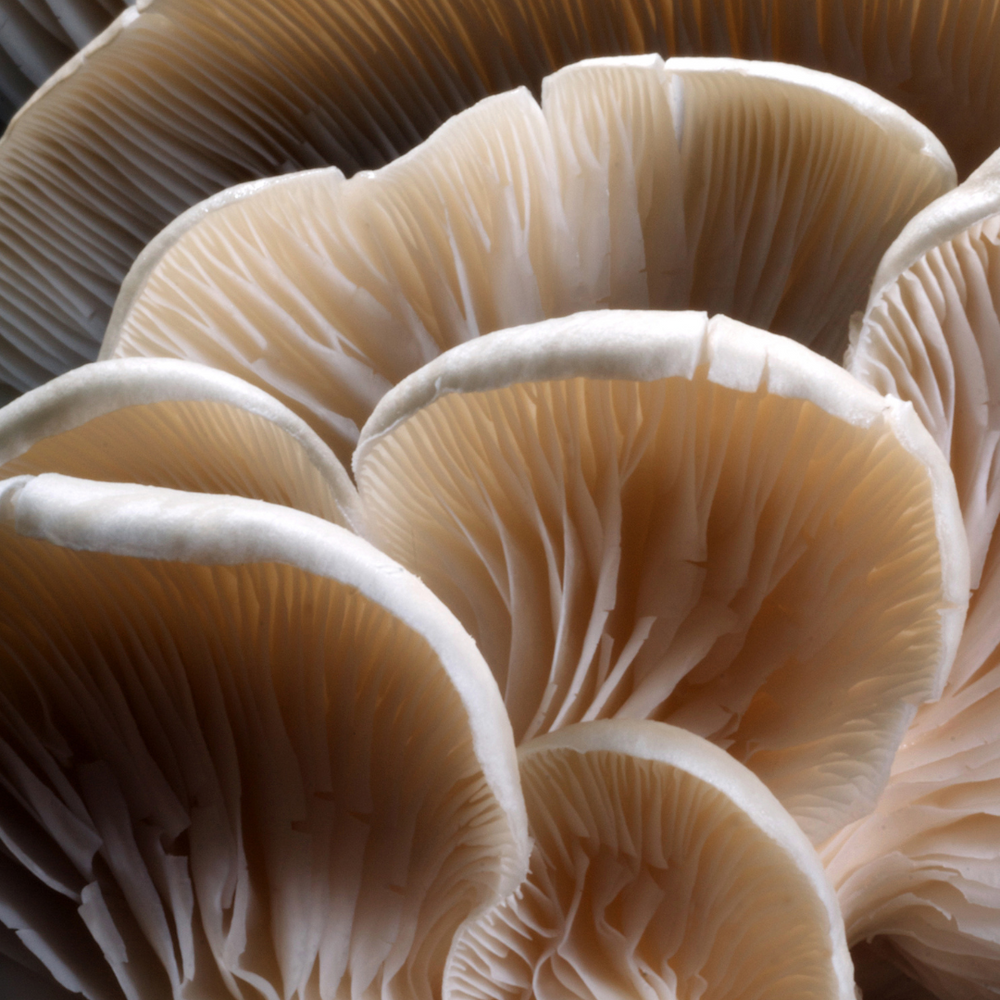
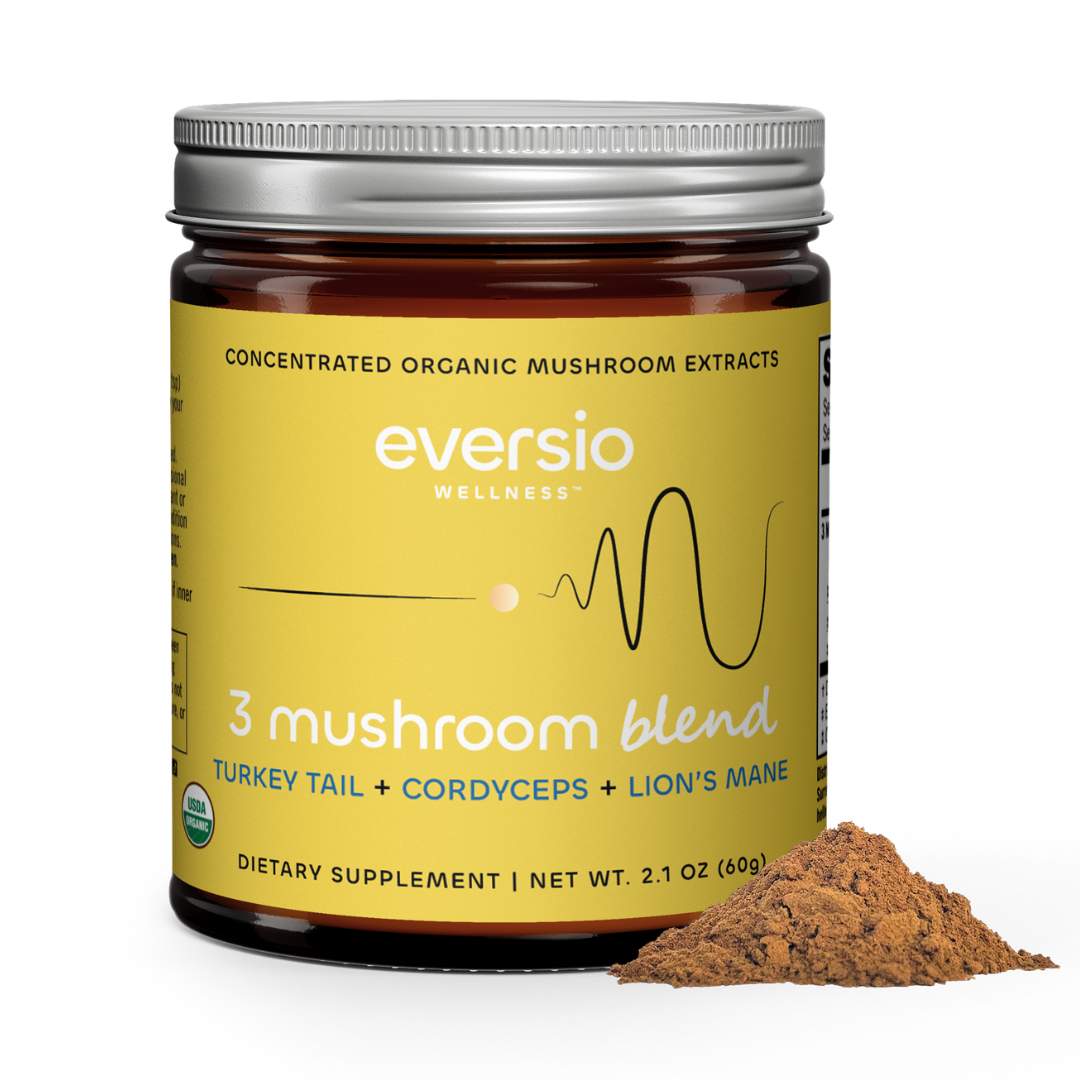
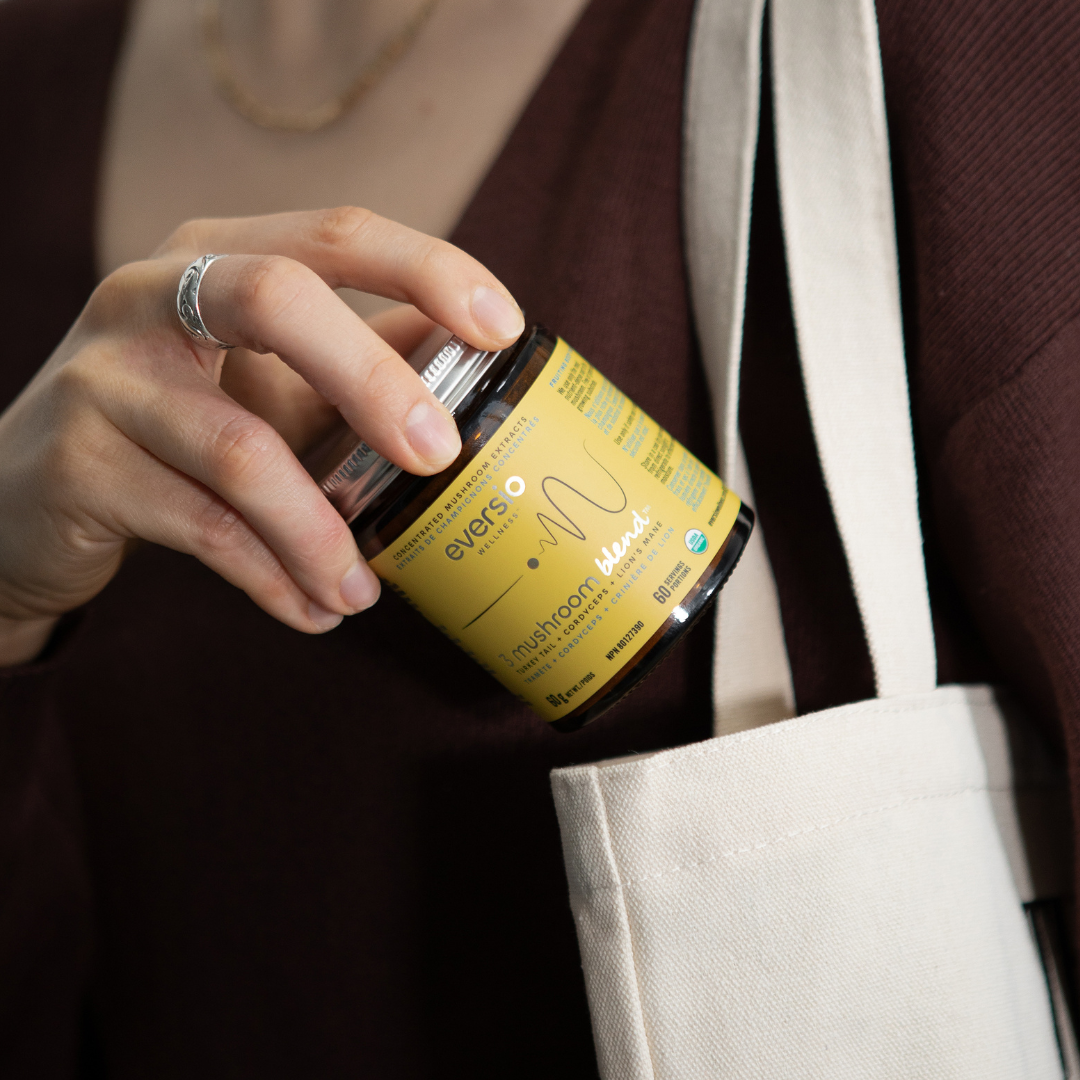

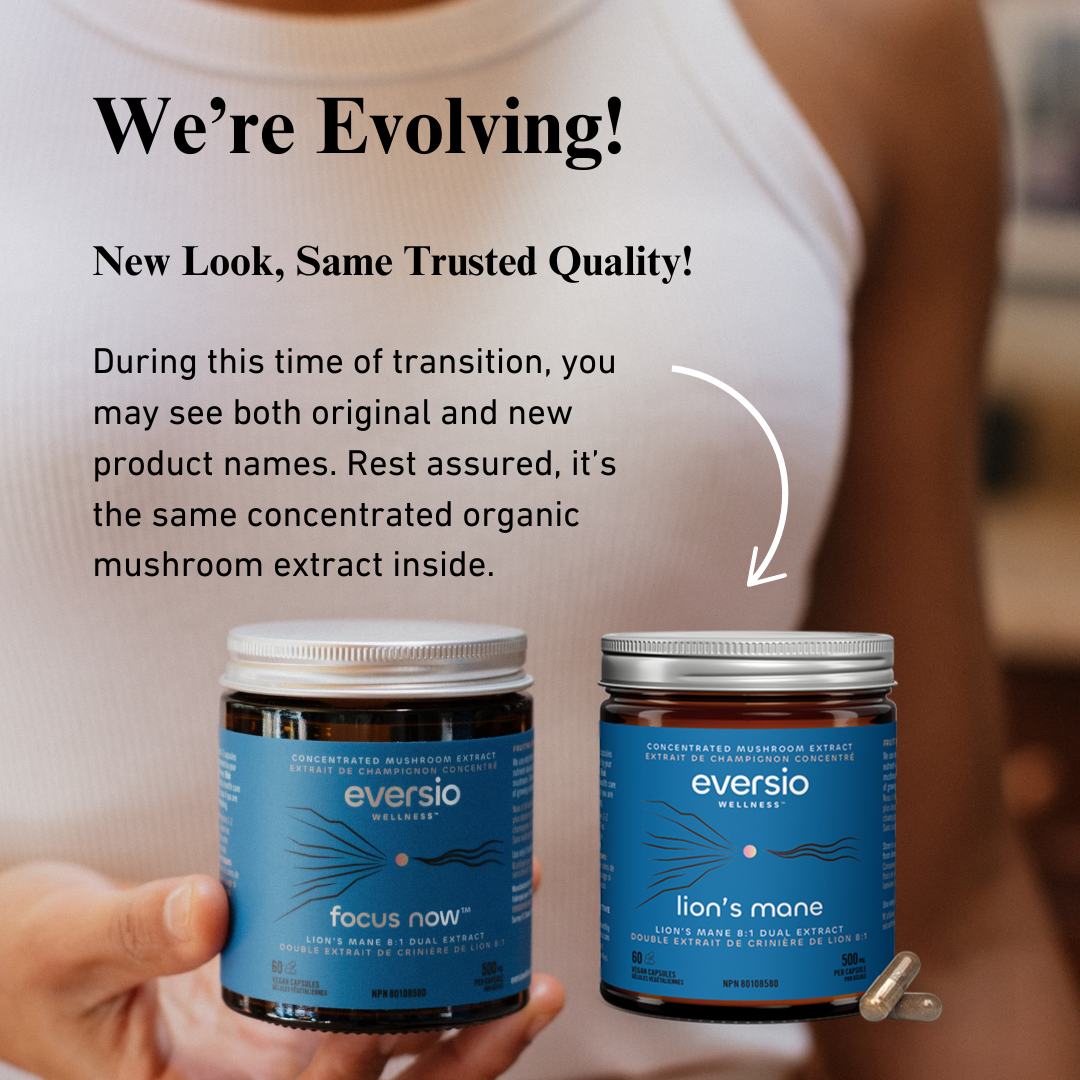
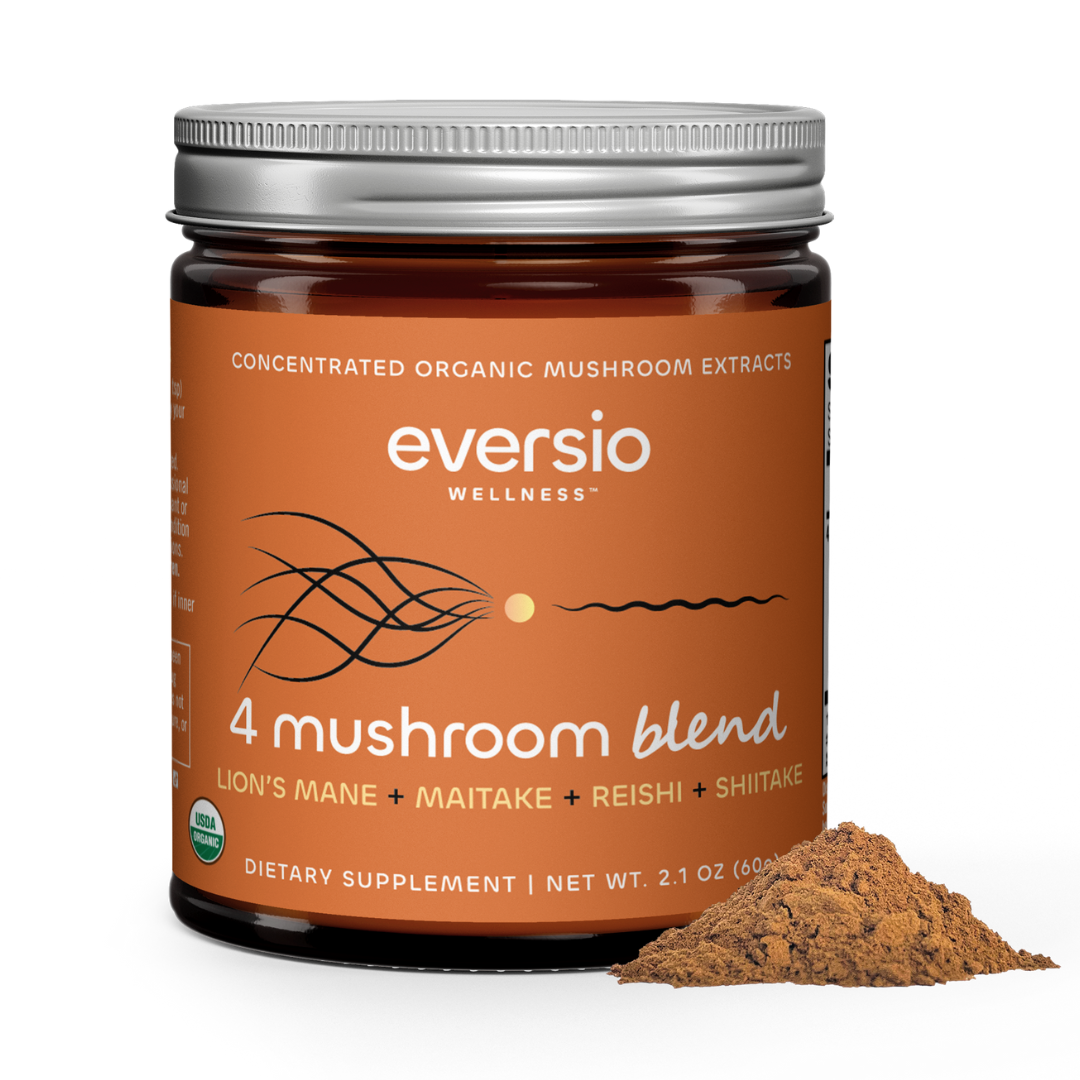

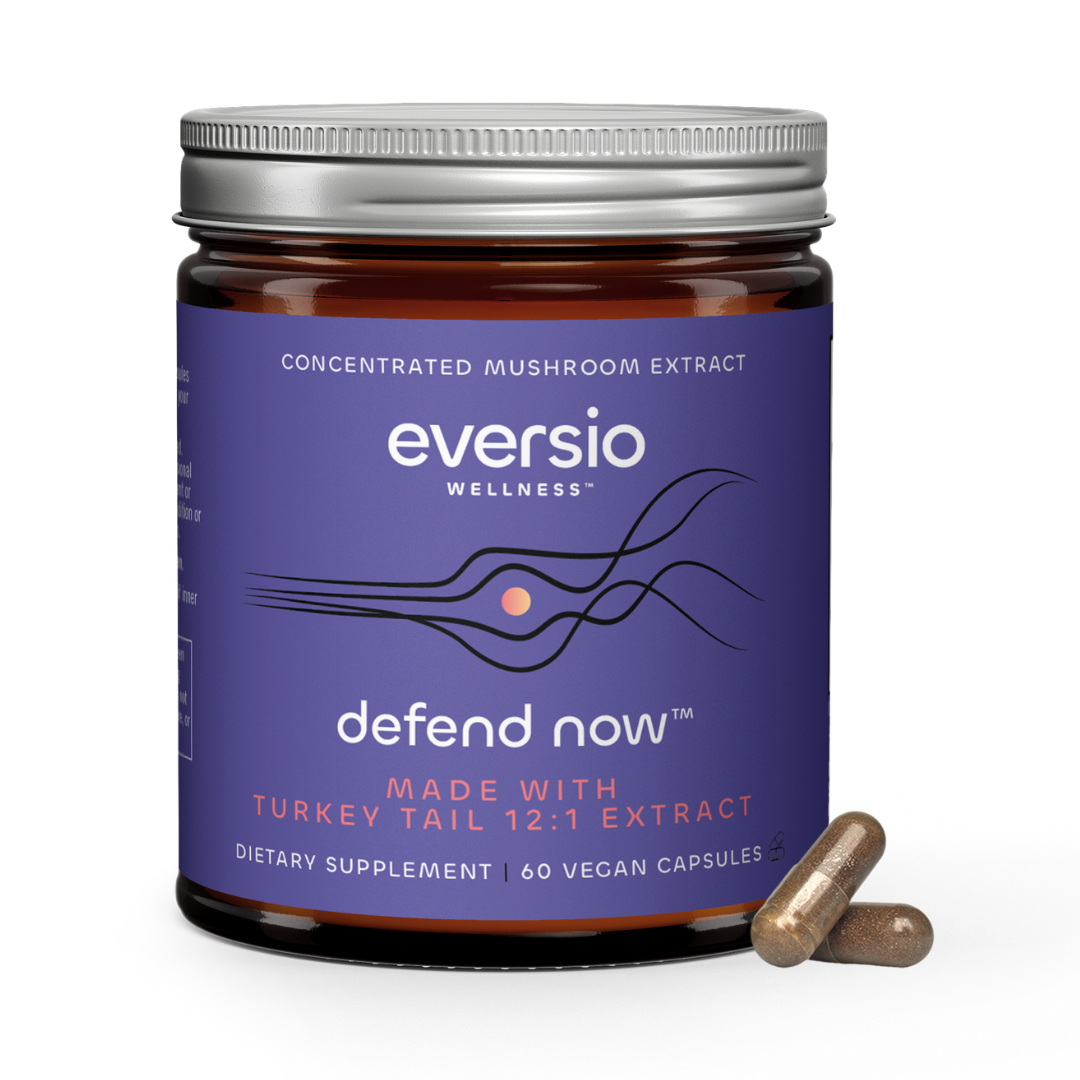
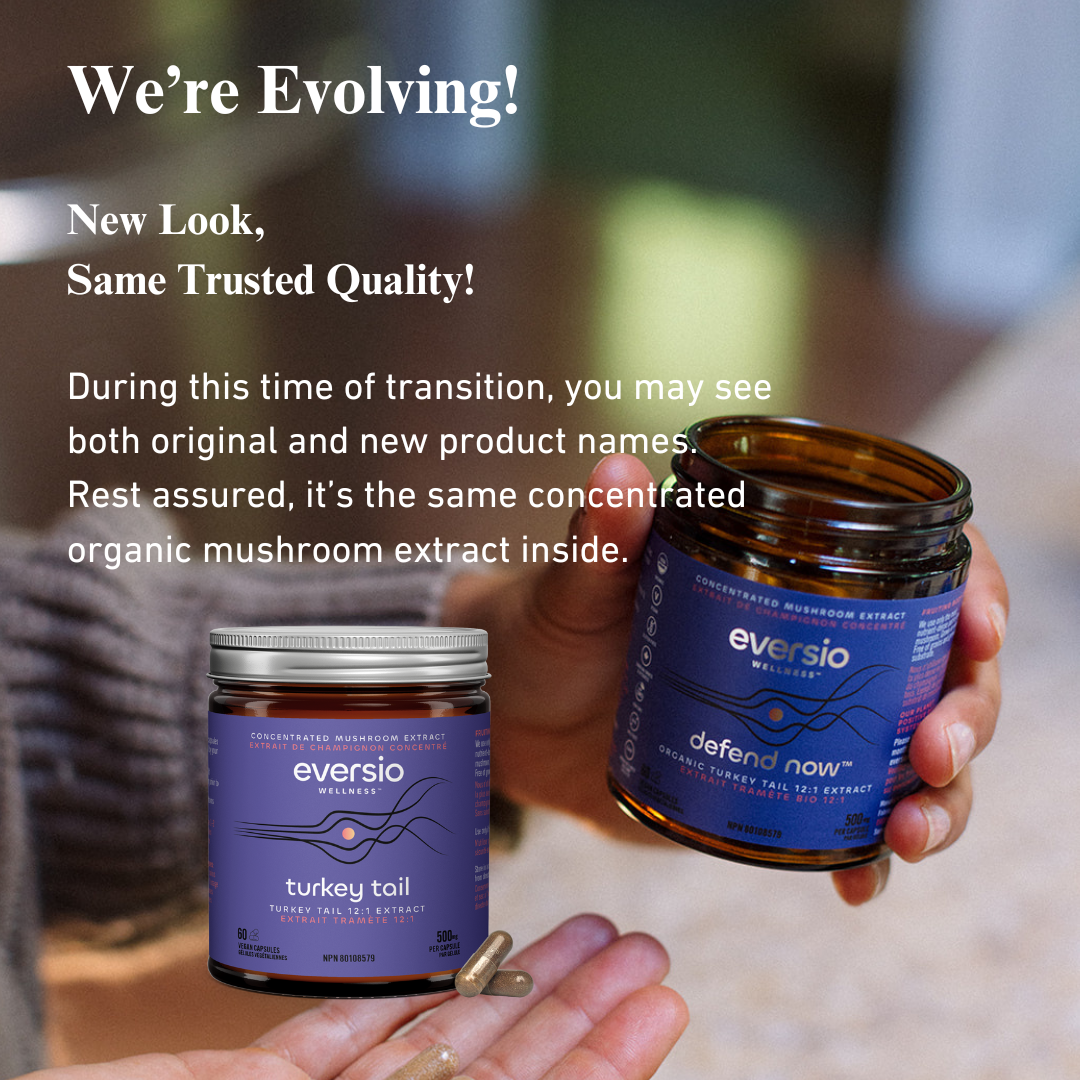
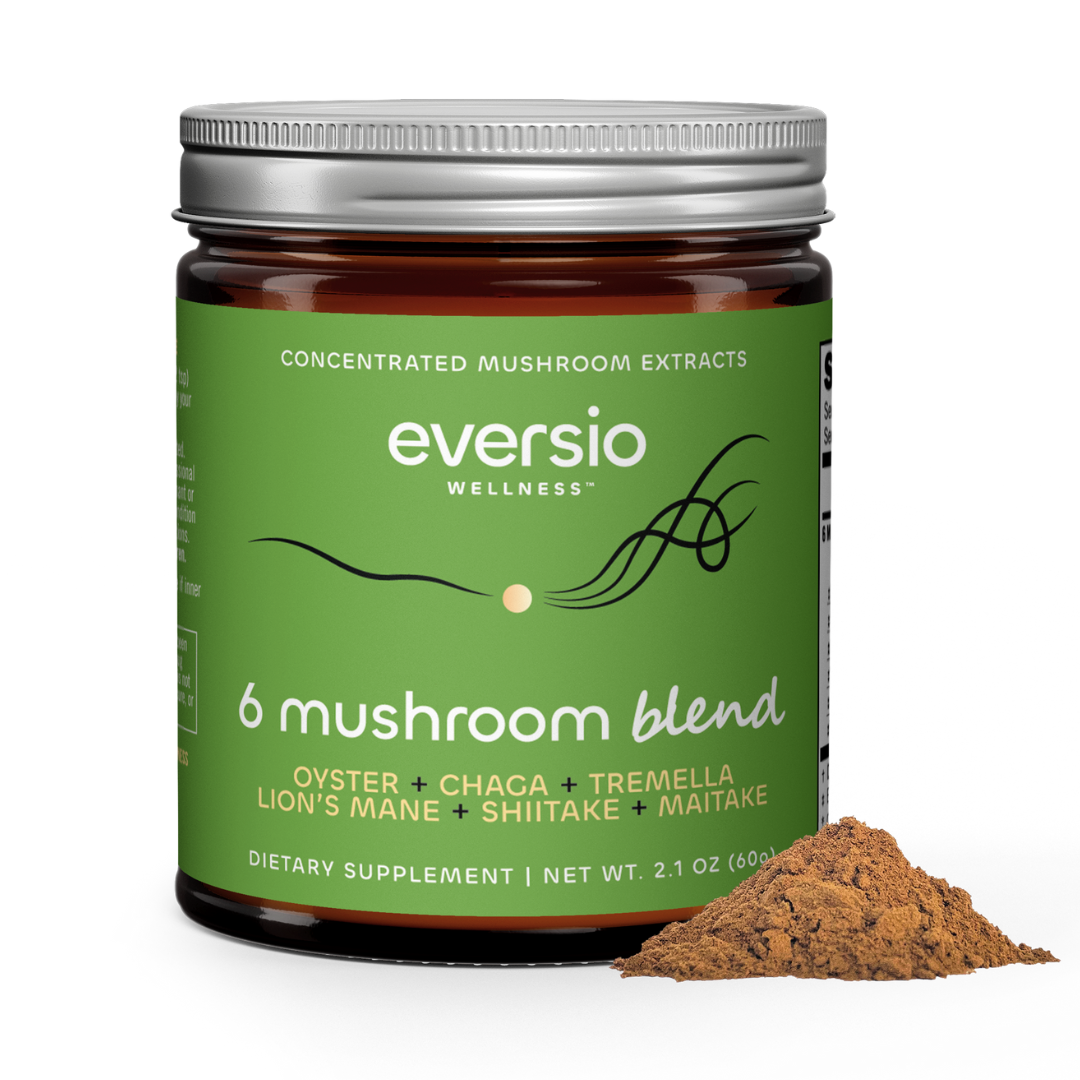
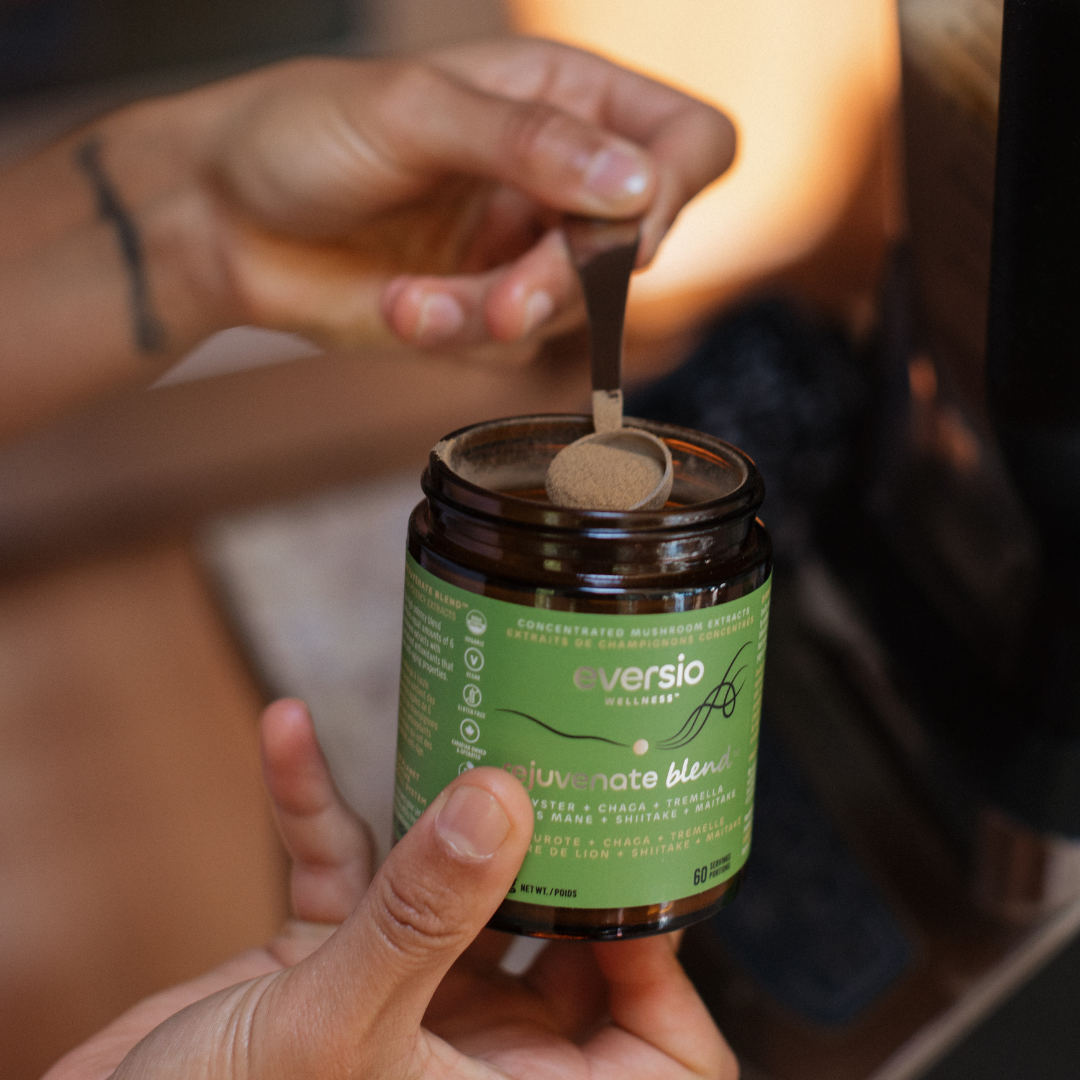
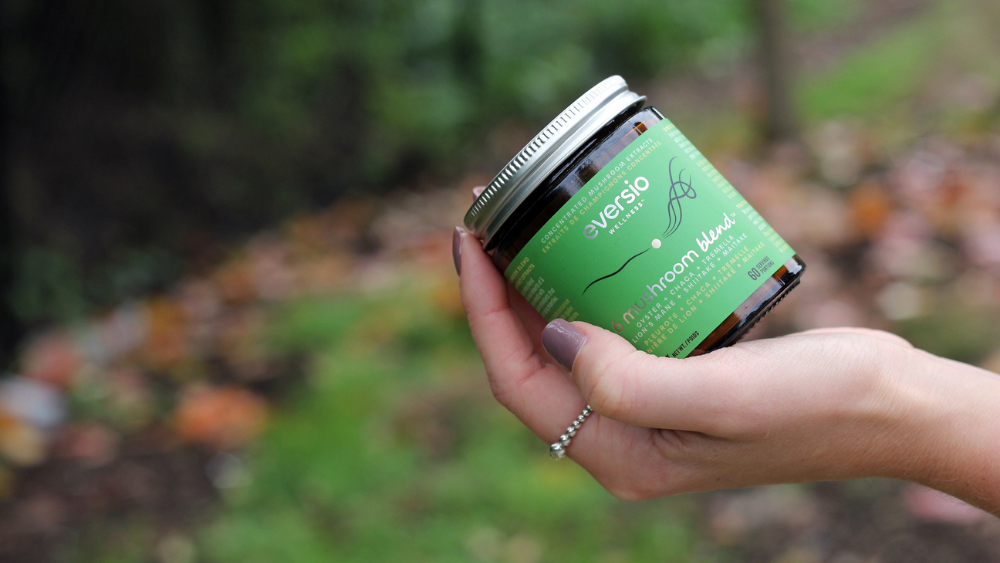
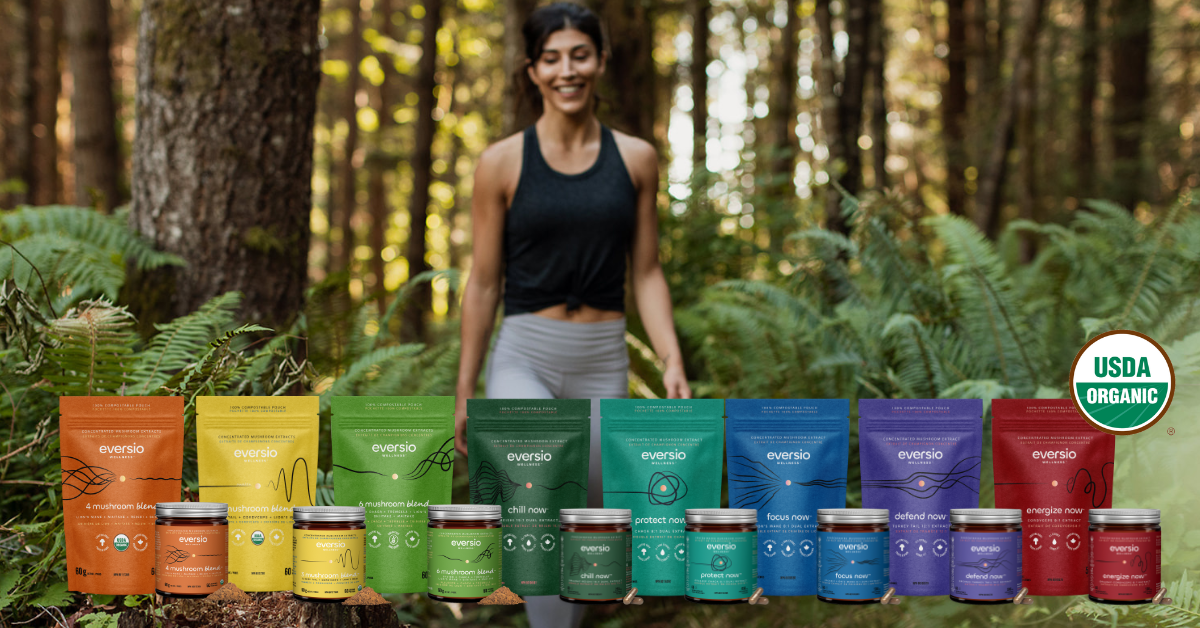






Leave a comment
This site is protected by hCaptcha and the hCaptcha Privacy Policy and Terms of Service apply.